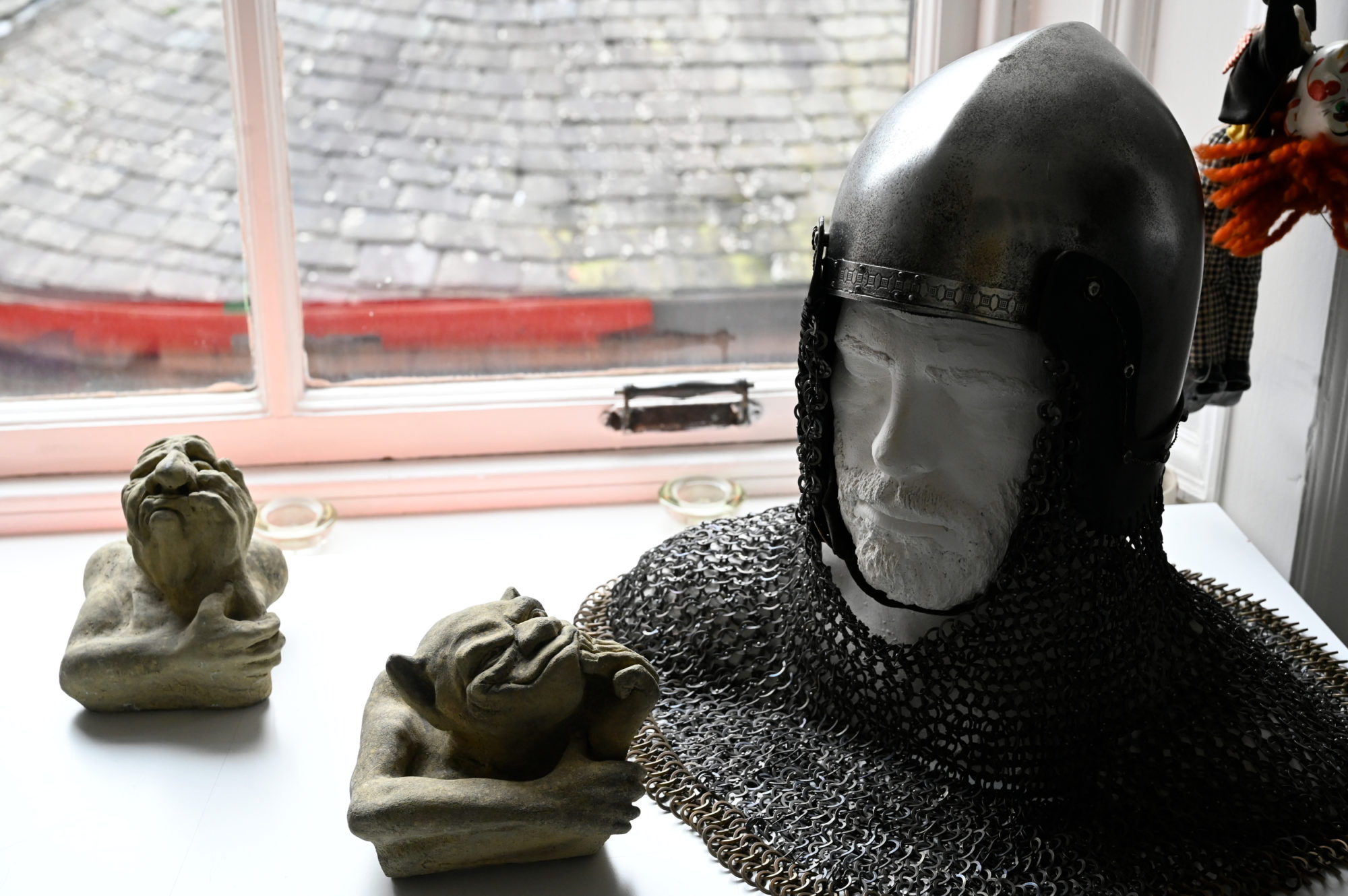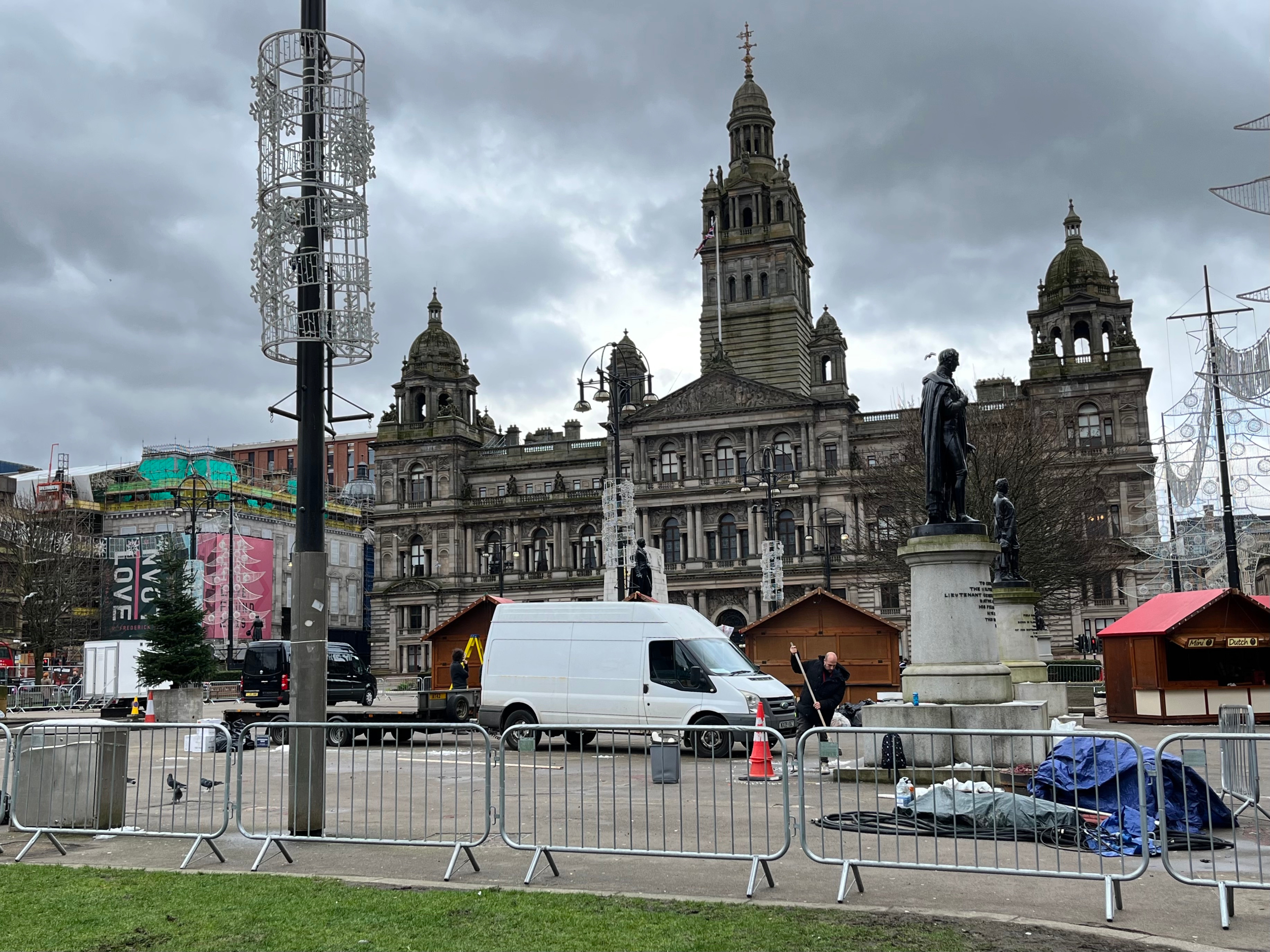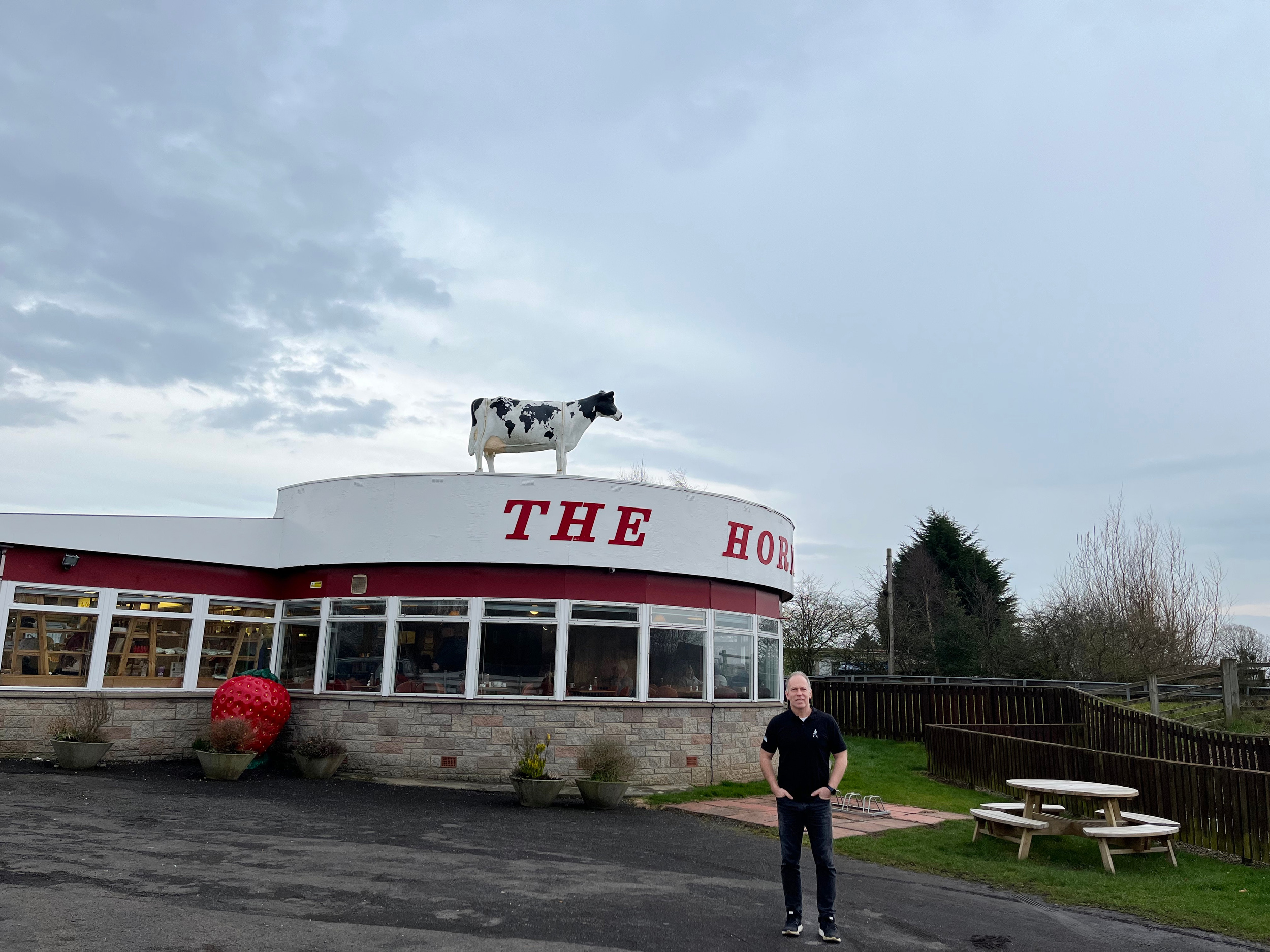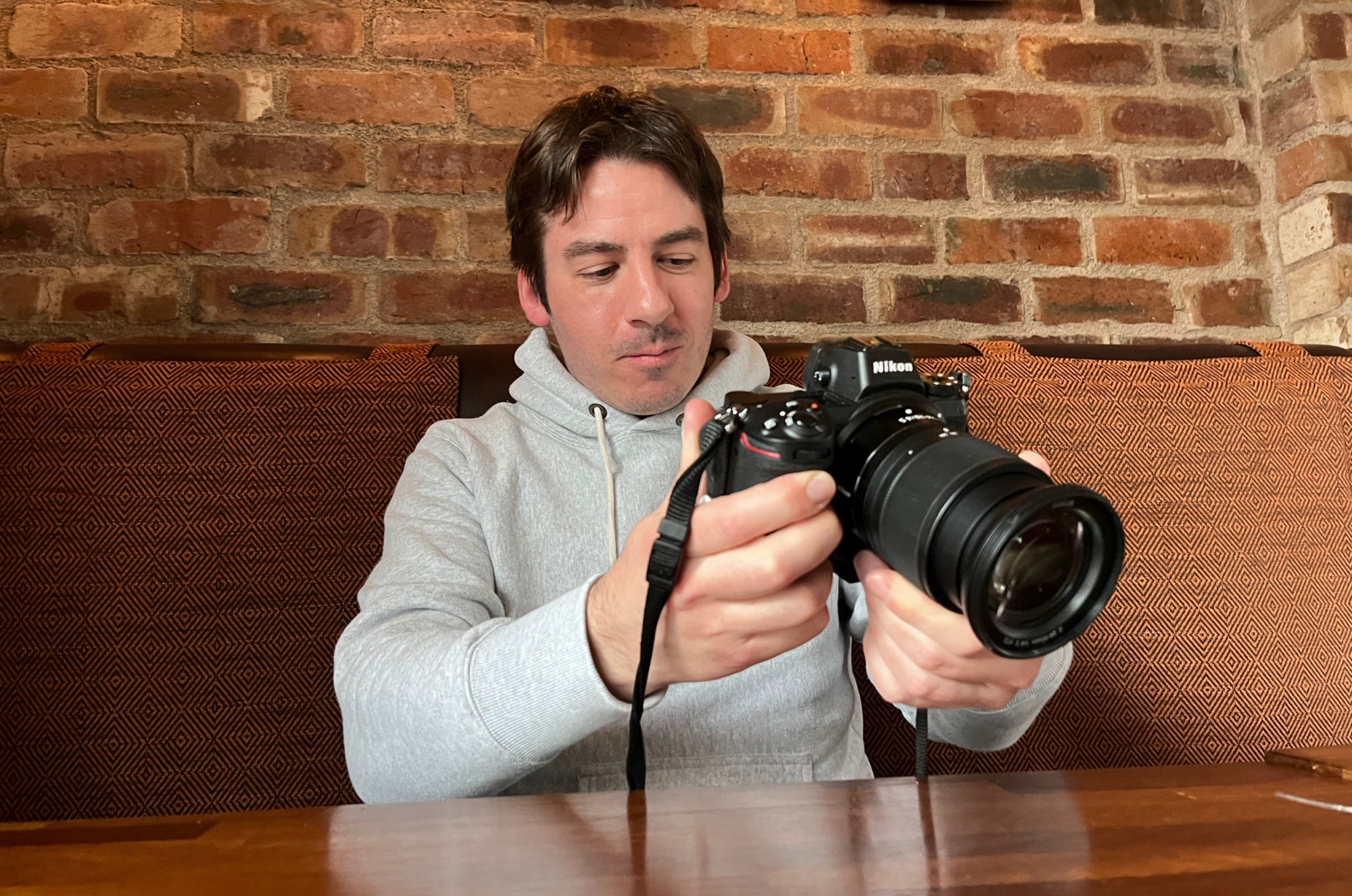Set in Scotland
by Katy Shero
A black armor helmet worn by Chris Pine in the film “Outlaw King” is displayed in the halls of Film City Glasgow, and a framed poster for “The Jacket,” which features Keira Knightley, hangs on the wall above.

Both movies star some of America’s biggest actors and were created and produced in Film City Glasgow: a production studio home to over 25 Scottish-film production, lighting and sound companies.
David Bratchpiece, the general manager of Film City Glasgow, has worked in the film and television industry for over a decade. As a movie buff, he said he cannot hold back a smile as he watches the collection of posters and props expand every year.
He said he has had the opportunity to experience the growing Scottish film industry first hand since his arrival at Film City Glasgow in 2015.
“We started off as a couple of offices back in the days, and then gradually over time, all sorts of production companies began to move in. Now, we have many productions, set construction and film shoots happening every day here because of the growing demand,” Bratchpiece said.
The old municipal facility is home to more than 20 film and television production companies, including BBC Scotland. What used to be a hub primarily for smaller productions can now accommodate the expanding number of larger film and television productions in Glasgow.
“They’ve been recently doing a lot of production in our facility, including a comedy show presented by a Scottish stand-up comedian, Frankie Boyle, who’s a really famous and popular guy here,” Bratchpiece said. “It’s a big deal for projects like this because he’s from Glasgow. So him returning to do his new TV show here gave us a lot of money to build our own stage and totally transform the place to look amazing for the TV audience.”
Bratchpiece said the film and television industry in Glasgow, and Scotland in its entirety, was “kickstarted” by the filming of World War Z with Brad Pitt in 2011.
Glasgow’s city centre has been a prime location in the past few years for large productions. George Square, one of the six squares in the city centre, was transformed into Philadelphia for a zombie apocalypse scene for the filming of World War Z.
“I remember getting off the train, walking out to the square and seeing all these crashed yellow cabs and fake dead bodies everywhere. It was a whole big production that we weren’t used to at the time,” Bratchpiece said.
Christmas tree lights were hanging last month throughout the city centre and mock wooden storefronts that resembled a Christmas shop village were visible in the square for the filming of HBO Max’s new movie, Batgirl.
George Square was also recently transformed into a mock Gotham for the filming of “The Batman” starring Robert Pattinson.
“There has been a deliberate effort by the city council to bring in big productions because they realized Glasgow looks great aesthetically on camera and can be used as a double for American cities,” Bratchpiece said.

To accommodate the growing industry, another major studio is under construction in Glasgow. Kelvin Hall, previously an international arts and sports venue, is now being renovated into a film production studio that will be operated by BBC Studioworks. The 10,500 square foot facility is expected to open in fall 2022 and is co-funded by the Scottish Government and Glasgow City Council.
Jennifer Reynolds, film commissioner for the Glasgow Film Office, said Kelvin Hall is a “major development” for the industry.
“The TV studio will focus on larger-scale productions and, in conjunction, the city council is involved with a number of training initiatives for local production companies to help create projects that will be potentially filmed in this facility,” Reynolds said.
Reynolds has been working with Glasgow Film Office, a department within the Glasgow City Council, for 20 years. Her job is to help market Glasgow as a “viable production center” within the United Kingdom and to work with productions to ensure everything operates smoothly.
“I help make sure companies have all the right permissions, are dealing with the right people and get suggestions for locations, crew and how things work on the ground in that particular location,” Reynolds said. “We work with absolutely anybody, and the bulk of our inquiries, about 80%, are one-or two-day shoots.”
Reynolds said the television industry has been a steady operation, but the number of bigger, feature films shot in the city has grown substantially. These larger, specifically American, production companies have flocked to the streets of Glasgow, lured by lower costs and an accommodating city council.
“We can offer what a lot of other cities aren’t able to provide. We want filming to take place here, so we actively encourage productions with our calling card of everything that’s been shot here before,” Reynolds said.
Reynolds added that the city council road department has a “great reputation” among production companies for making roads and locations accessible to movie makers.
“Batman was shot here before lockdown, and there was a significant scene in the Necropolis, which is the Victorian graveyard east of the city,” Reynolds said. “The location manager had seen it on a previous visit to Glasgow, and once he was working on Batman, he came up, scavenged it and immediately said, “Yeah, that’s what we’re looking for,” so we fulfilled that wish.”’
Reynolds said the Glasgow Film Office aims to please filmmakers because the industry is “extremely beneficial” to the Scottish economy. She said filming in the city creates jobs and encourages spending among restaurants, stores and hotels.
According to Screen Scotland, the Glasgow film industry had a gross value added, a measurement of an industry’s contribution to an economy, of around 13 million dollars in 2016, and this number continues to increase.
The Citizen, a Glasgow bar and restaurant, is one beneficiary of the wealth created by production companies. Located in the city centre, Maruisz Wrona, the general manager, said he gets customers from crews and casts of productions, and the “regulars” are “overjoyed” to sometimes meet and eat with those involved with productions.
“Customers tell me everyday how excited they are when big films are in town,” Wrona said. “It’s definitely had a positive impact on our business.”
However, not everyone reaps the benefits. Paul Nelson, an Uber driver who does the majority of his driving in Glasgow, said city filming is a “major, major inconvenience” for him and other drivers.
“Roads get blocked off, and there’s subsequent traffic congestion as a result,” Nelson said. “Most of the people working on set and in production get chauffeurs anyway, so it’s not like I’m getting extra opportunities for work.”
Nelson added that for workers like him, the productions complicate their lives and crowd them out of their own city.
“As time goes on and the city council welcomes more production, it brings even more people to Glasgow for vacation and tourism,” Nelson said. “It’s already crowded here, and though I suppose some people get the benefits from this, the normal Glaswegian definitely doesn’t get much from it.”

However, the growing film industry is not only confined to Glasgow. Places like Edinburgh and the Scottish Highlands are gaining traction with production companies, and this includes Perth: home of the Horn Milk Bar restaurant.
Kenny Farquharson, Horn Milk Bar owner, said he has had five film shoots in his restaurant over the last 10 months, including a new Disney+ series, “The Wedding Season,” and a popular BBC series, “Peaky Blinders.”
“The Horn is well known in Scotland, as well as the UK, and a lot of people coming down from the north pass here every day and know we’ve been here for a long time, so I think that’s the reason we keep getting film companies to shoot here,” Farquharson said. “We get to see the whole crew and stunt teams and everything going on behind the scenes. It’s pretty awesome.”
Farquharson said it is noticeable that the film industry is growing throughout Scotland, and there are even organizations that encourage film production companies to venture into areas outside the cities, such as where his restaurant is located.
“It makes sense Scotland is so attractive for filming because of the scenery,” Farquharson said. “It might be an old farmyard or somewhere in the country. Companies are always looking to find somewhere unique to film at.”
David Dawson, a Scottish independent filmmaker and actor, agreed that the industry goes beyond Glasgow, but the growth is squeezing out some Scots. Dawson is based in Edinburgh and was an extra for “Outlander,” a popular show on Starz and Netflix filmed in various parts of Scotland.
Dawson said the large-scale productions pose more competition and create difficulties for local and independent filmmakers and actors trying to break into the industry.
“It can be brutal when you’re a small actor or you’re working without agent representation to get your foot in the door,” Dawson said. “It’s hard to work with these production companies who have big budgets, but want to cut corners, and you’re one of those corners.”
Dawson said American and other foreign production companies are not as considerate of Scottish culture and are not often willing to use or seek talent from Scotland.
“It’s great because filming here and talking about us puts Scotland on the map, and I think it makes Scottish people feel quite seen and warm, but it’s still not benefiting our local actors who are really qualified,” Dawson said.

Allison Gardner, CEO of Glasgow Film, said she is working to bring recognition to smaller Scotland actors and filmmakers, like Dawson. Glasgow Film has seen industry growth through a different perspective: independent cinema.
Glasgow Film is responsible for operating the Glasgow Film Theatre, which shows independent cinema, and Glasgow Film Festival, which has been “crucial” to supporting the film industry in Scotland. Gardner said the “homegrown talent and creativity” that is fostered by events like the film festival boost and encourage the larger-scale productions.
“A lot of people just think of these larger productions when they think of the growing industry and forget about the smaller industry,” Gardner said. “Like Martin Scorsese said, you have to watch great films in order to make great films. If you only watch Batman or Marvel, then you’re just going to make some sub-genre of that, when really, you need a whole lot of different films and also ones in different languages.”
Regardless of the size of film production in Scotland, Gardner said companies and filmmakers need to take diversity into account if the Scotland film industry hopes to build on its success.
“The big productions are great because they bring in money, but what we need to bring in is stories from marginalized voices,” Gardner said. “We need more stories from women, people of color, the LGBT community, et cetera. We need to have a breadth because great cinema engenders empathy, which we need more of here.”
Bratchpiece said he also hopes to see more growth in the future for the “homegrown” industry collectively with the larger, outsourced industry.
“Personally, I think we’d all like to see the money that’s being made from these big U.S. productions channeled back into an expansion of our Scottish local industry,” Bratchpiece said.
“With all these things combined, I think there’s a lot of good spirit in the industry right now. It’s the perfect time for film and television here in Scotland.”
~ 04.18.2022